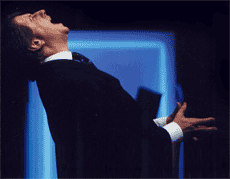Top Dogs |
 |
“Business is war”, declares one of the characters in Urs Widmer’s 1996 play Top Dogs, performed at the Oxford Playhouse earlier this week. Shortly thereafter, he bursts into tears. Top Dogs introduces us to six characters, five of whom were at the helms of big business before becoming redundant. The sixth character is their trainer, helping them deal with the psychological and emotional impact of redundancy, as well as preparing them to re-enter the workforce. Their stories are demonstrative not just of the cut-throat world of big business, but also of the human condition – how one deals with loss, trauma, and change, perceptions of success, and familial/personal relationships. The set is sleek and modern, with neon-lit partitions swivelling into tables and a proper corporate chair for each character. In a tradition begun with the original production, the characters use the actors' own names. Co-founder of Dialogue Productions, the director Patricia Benecke, stepped in at the last moment for Mary Keegan, reading aptly but perhaps lacking some of the authority necessary for the role of trainer. Fellow Co-founder Patrick Driver’s character – weak, a hyperchondriac, and struggling to make sense of both his business and personal failures, was especially touching. In terms of storyline, the first two-thirds of the play are compact, comprehensive, and intriguing. A newly-redundant corporate manager enters the retraining centre, slowly coming to grips with his employment situation. As he does this, others are invited to join in, explaining how it felt to be made redundant, hesitantly shedding their pride and admitting the rough times they faced, and are constantly confronted with. They are retrained – taught to dress and walk properly. Others deal with marital and familial issues brought to the fore. Final, we hear their unspoken dreams – their desire for motherly approval, adventure, revenge, an exciting job, and love. After these separate yet connected episodes in the play, the final portion seems a bit disconnected – with talk of a new utopia, and a lament involving frenzy and a never-ending list of today’s ever-present multi-national companies. While the stress and anxiety make sense, I do wonder if it could have been interwoven within the play to a greater extent. Nonetheless, this is an excellent production with superb acting all-around, and highly-recommended. |
|